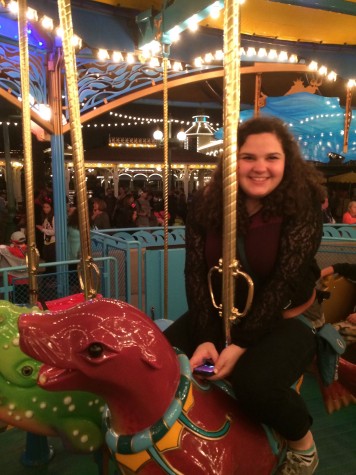The Voter’s Guide: 2016 Oregon Ballot Measures
November 2, 2016
 Clarion photo Ashley Lytle
Clarion photo Ashley Lytle
A new ballot brings a fresh set of proposals, promising to better Oregon living. From a measure mirroring the likeness of a modern day Robin Hood to one stipulating Outdoor School for all, the 2016 election assures that voters’ ballots will be chock-full of colorful commitments.
At the Clarion, we always encourage informed voting practices. Below-listed are the proposed changes for each ballot measure, alongside the Clarion’s editorial stance on each issue. We strongly urge voters to exercise their right of voice in the coming election, and hope that you will consider each measure with the utmost deliberation.
Measure 94
 The implementation of Measure 94 would repeal the 1960-established Measure 9, which called for the mandatory retirement of judges at age 75. Supporters of this proposed amendment describe the law as discriminative, as no current research demonstrates that 75 years is a universal age for competency declination. “As an active trial attorney, I can sincerely state that some of the best jurists are those with the most life experience,” said Jason Heym, attorney. “It is a disservice to the community at large and the legal community specifically to force the most experienced people from the bench. Age is not a good indicator for vigor and effectiveness.”
The implementation of Measure 94 would repeal the 1960-established Measure 9, which called for the mandatory retirement of judges at age 75. Supporters of this proposed amendment describe the law as discriminative, as no current research demonstrates that 75 years is a universal age for competency declination. “As an active trial attorney, I can sincerely state that some of the best jurists are those with the most life experience,” said Jason Heym, attorney. “It is a disservice to the community at large and the legal community specifically to force the most experienced people from the bench. Age is not a good indicator for vigor and effectiveness.”
Currently, polls show that while 33 percent of voters support the measure, 53 percent oppose it. Those against the amendment believe that there is not enough evidence to warrant such a dramatic change to the Oregon Constitution. “Hope alone does not constitute a sufficient enough basis to change the Constitution,” said Ken Fairfax, City Club of Portland member.
Clarion staff members favored this ballot measure. Said Jacquelyn Johnson, Clarion reporter, “As long as they can physically judge a court case with expert opinion and skill, judges should be able to go as long as they want.”
Measure 95
Ballot Measure 95 would allow public state universities to invest in equities, thus reducing financial risk for Oregon state institutions and increasing funds available to help students financially. The revenue from this measure would specifically target support for academic programs and student success. Additionally, the measure is projected to minimize tuition increases and help make higher education more financially attainable to middle-class Oregonians. “Measure 95 ensures that Oregon’s public universities will have a financially sound investment strategy for their money by allowing them to invest in stocks—a critical and prudent basket of investments,” said Oregon State Treasurer Randall Edwards.
The opposition to this measure has no public representatives and has raised $0 in total, but accounts for 24 percent of the vote in polls. Twenty-nine percent of the vote belongs to the advocates for Measure 95, who have raised nearly $800,000. In the sample size of 610 participants, the majority of those polled, 47 percent, were undecided.
Clarion staff members voted in complete support of this measure, a universal consensus. Said Clarion sports editor Allie Montgomery, “Education should be allowed for everyone and I support financial aid to get people to their dreams.”
Measure 96
At a prospective value of $4 billion per year, Measure 96 would dedicate 1.5 percent of state lottery net proceeds to veterans’ services. Currently, the active wait time for veteran access to services is 39 months, a time supporters argue is too long for our government to help the men and women who served us on the frontline. Instilling this measure would likely shorten this wait-time for many veterans, and would additionally provide health care, mental health and addiction treatments, prevention of veteran homelessness, and support with posttraumatic stress disorder for veterans. This measure is wildly supported, topping 83 percent of the vote in polls.
Those who oppose the measure argue that 96 would interfere with creating a balanced budget and would diminish resources available for education. “Oregon’s veterans need better services, but Measure 96 is not the way to fund them, and voters should reject it,” The Oregonian said. The opposition currently holds 8 percent of the vote in the polls.
This measure was widely favored by Clarion staff members, Montgomery stating, “I know people who served in the army and I think they should be honored in every way possible.”
Measure 97
Undoubtedly, Measure 97 has been the most controversial proposal on the ballot, pitting multi-million dollar companies against individuals of lesser salaries. Not unlike a modern day Robin Hood, Measure 97 would implement a 2.5 percent tax on corporate gross sales exceeding $25 million yearly. The tax, if actualized, would raise $3 billion dollars per year, all of which would be allocated proportionately to public early childhood programs, K-12 education, healthcare, and senior citizen services.
It is unsurprising that the opposition has so much fiscal backing from high-earning companies, nearly topping $17 million in funds. Those against the measure claim that 97 would burden low-income earners rather than high-income earners, and insist that the measure’s implementation would decrease the rate of job creation. Measure 97 “will dampen income, employment, and population growth over the next five years. In fact, it is expected to reduce employment growth by more than 20,000 jobs over the next five years, with private sector job growth slowing while public sector job growth accelerates in order to spend all that new tax money,” said Steve Buckstein, founder and senior policy analyst at Cascade Policy Institute.
Measure 97 received high praise from the Clarion editorial board, who voted to support it almost universally.
Measure 98
The implementation of Measure 98 would facilitate the use of state funds towards dropout prevention and college and career readiness programs. Supporters argue that the instillation of these programs would boost graduation rates in Oregon. Similarly, advocates contend that Measure 98’s programs would better prepare students for the work force, especially those who choose not to pursue an education beyond high school.
Campaigns opposing 98 argue that the measure would encourage students to only enroll in school part time, lengthening the standard high school graduation plan.
Clarion staff members greatly favored this ballot measure, arguing from personal experience that the prevention programs would greatly help students in need.
Measure 99
Assuredly a popular candidate among outdoorsy Cleveland students, Measure 99 would create an Outdoor School Education fund, made possible through state lottery proceeds. The measure is supported by a colorful array of politicians and companies, most notably endorsed by Gov. Kate Brown [D-OR], Kaiser Permanente, and Nike.
Nay-sayers call the measure restrictive and exclusive, arguing that not all fifth and sixth graders would benefit from 99. According to Sen. Betsy Johnson [D-OR], Outdoor School for All, a major sponsor of the measure, would only allot money to schools that promote the organization’s preferential criteria: higher test scores, fewer discipline programs, and improved Language Arts skills. Additionally, said Johnson, “We cannot rob other programs every time advocates organize for a cause and decide they know what’s best for everyone.”
Currently, support for the measure holds 69 percent of the vote in the polls.
The Clarion editorial board aligned with polled voters. Outdoor education “has the ability to help change, excite, and inform students about different ways of learning and what works for them,” said Editor-in-Chief Anna Rollins.
Measure 100
The implementation of Measure 100 would prohibit the sale of products from and parts of 12 endangered animals in Oregon, including the rhino, cheetah, tiger, sea turtle, lion, pangolin, elephant, whale, shark, jaguar, ray, and leopard. Most notably, this measure is supported by U.S. Representative Earl Blumenauer [D-OR], the Oregon Coast Aquarium, and the Humane Society. “Poachers and traffickers exploit weak laws and regulations to sell ivory, rhino horn, and other endangered species parts with low risk of detection or prosecution,” said Blumenauer. “Oregon should not serve as a market for these illicit products, and we must do what we can to avoid contributing to the crime and cruelty.”
The opposition, which makes up seven percent of the vote, calls this effort frivolous and irrelevant to Oregon voters. “If you’re going to try to protect elephants, focus the limited resources where they’re going to do the most good. Don’t create a new class of criminal [offenses] because you’re frustrated you can’t reach the poachers in some other country,” said Robert Mitchell, member of the Elephant Protection Association.
Measure 100 received a full consensus of support from Clarion staff.














